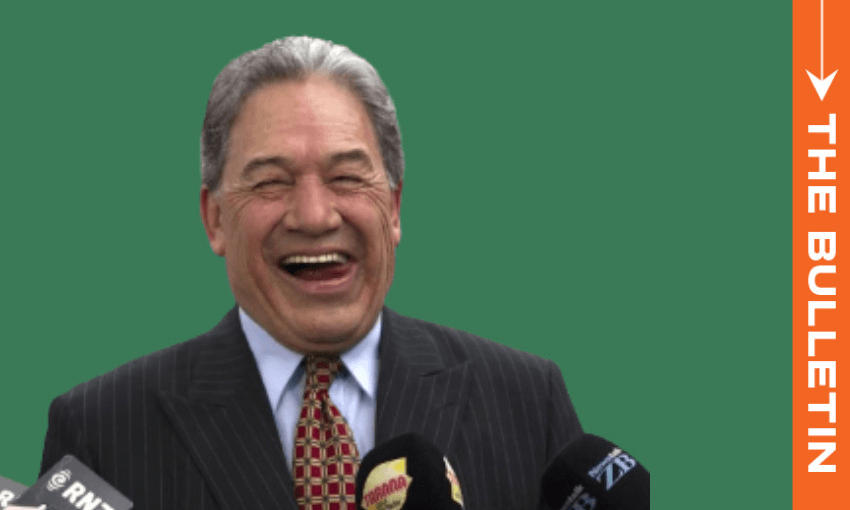Warnings are growing louder that a vote for NZ First could be a vote for post-election chaos. But does National only have itself to blame, asks Catherine McGregor in this excerpt from The Bulletin, The Spinoff’s morning news round-up. To receive The Bulletin in full each weekday, sign up here.
Panicking? Who’s panicking?
Chris Luxon may continue to insist he “doesn’t know” Winston Peters, but his campaign certainly does – and they’re increasingly worried about him. Echoing former leader John Key a few days earlier, campaign manager Chris Bishop told Claire Trevett in the Herald on Sunday that National needed a “strong vote for change” to avoid the alarming prospect of a second election. His plea came as a Curia/ Taxpayers’ Union poll showed surging support for Peters’ party, with the gap between NZ First and Act down to just 2.2 percentage points. According to the NZ Herald’s polling analysis, there is currently a 60% probability National and Act will need to deal with NZ First to form a government. And what happens if they can’t come to an agreement? There’s “a very real and growing possibility” that the country would be left with no choice but to go back to the polls, Bishop warns. Labour have pounced on the comments, with Grant Robertson saying National have “introduced chaos into the last week of the campaign” by raising the possibility of a no-deal. As for Peters himself, he’s clearly enjoying the drama. “Mr Bishop, don’t panic,” he said. “Help is on its way.”
The dreaded prospect of a new election
So how likely is a second election, really? Political law expert Andrew Geddis digs into the issue this morning on The Spinoff. It’s possible but not likely, he thinks, given how many forms a governing arrangement could take, and the freedom parties have to decide on the shape and content of any such agreement. But if talks do break down irrevocably, then at some point – sometime early in 2024 – we will get “a full rerun” of the election, “all at the cost of somewhere north of $150 million”. It’s hardly an appealing prospect, and it might all have been avoided if Luxon had acted more decisively. It was late July when The Spinoff’s Toby Manhire first called on the National leader to rule out NZ First as a potential coalition partner. Even Luxon saying he was open to talks with Peters wouldn’t be so bad – as long as he did it early enough. Instead, Manhire wrote this weekend, by leaving it so late, Luxon managed to “give Winston Peters a massive promotional leg-up in the peak attention period of the campaign”. Now both National and Act are dealing with the fallout from that botched decision, Manhire says.
Peters backs himself into a corner over a potential Labour deal
As for Labour, Hipkins has again reiterated that he has no intention of picking up the phone to Peters post-election: “The country is fed up by being held to ransom by Winston Peters so if you don’t want that to happen, give your vote to Labour.” Peters likewise has repeated his promise not to work with Labour. Could Hipkins and Peters still somehow overcome their mutual dislike for the sake of power? It’d be tricky, writes Vernon Small in the Sunday Star-Times. Peters’ “preferred strategy [is] to play the two sides off and negotiate in parallel” and he has “usually maintained a smidgen of wriggle room that would allow him to exit stage right or left”. But he’s been much more definitive this campaign “and his supporters, especially the conspiracists, would run for the exit if they caught a glimpse of Labour through a crack in the curtain”. That doesn’t mean a Labour-NZ First deal couldn’t happen, but Peters would have some very angry voters to contend with if it did.
A late-breaking case of Hipsteria?
With or without NZ First, Labour are feeling increasingly confident about their chances – or so they say. Though Labour’s polling hasn’t budged from its high-20s, there’s a new spring in Hipkins’ step, writes Tim Murphy on Newsroom. Fresh from his Covid confinement, the PM “experienced something rare” at the Pakuranga night market on Saturday: “the fleeting, fervent embrace of electoral excitement”. The 11th hour dose of “Hipsteria” (a more botanical-sounding version of Jacindamania), while welcome, serves also to underline “how Labour and Hipkins have left too much, too late this campaign cycle: policy releases, big ideas, bold politicking and risks on the stump”, Murphy writes. “They’ll need the seven-day revolution to occur this week or they’ll be left with an excess of what-should-have-beens and what-might-have-beens.”
